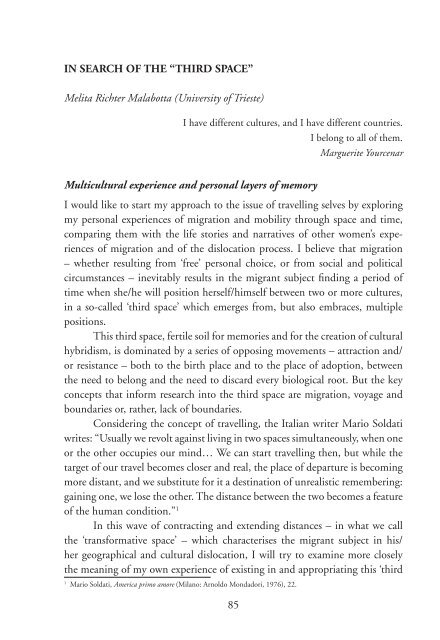Teaching Subjectivity. Travelling Selves for Feminist ... - MailChimp
Teaching Subjectivity. Travelling Selves for Feminist ... - MailChimp
Teaching Subjectivity. Travelling Selves for Feminist ... - MailChimp
You also want an ePaper? Increase the reach of your titles
YUMPU automatically turns print PDFs into web optimized ePapers that Google loves.
IN SEARCH OF THE “THIRD SPACE”<br />
Melita Richter Malabotta (University of Trieste)<br />
I have different cultures, and I have different countries.<br />
I belong to all of them.<br />
Marguerite Yourcenar<br />
Multicultural experience and personal layers of memory<br />
I would like to start my approach to the issue of travelling selves by exploring<br />
my personal experiences of migration and mobility through space and time,<br />
comparing them with the life stories and narratives of other women’s experiences<br />
of migration and of the dislocation process. I believe that migration<br />
– whether resulting from ‘free’ personal choice, or from social and political<br />
circumstances – inevitably results in the migrant subject finding a period of<br />
time when she/he will position herself/himself between two or more cultures,<br />
in a so-called ‘third space’ which emerges from, but also embraces, multiple<br />
positions.<br />
This third space, fertile soil <strong>for</strong> memories and <strong>for</strong> the creation of cultural<br />
hybridism, is dominated by a series of opposing movements – attraction and/<br />
or resistance – both to the birth place and to the place of adoption, between<br />
the need to belong and the need to discard every biological root. But the key<br />
concepts that in<strong>for</strong>m research into the third space are migration, voyage and<br />
boundaries or, rather, lack of boundaries.<br />
Considering the concept of travelling, the Italian writer Mario Soldati<br />
writes: “Usually we revolt against living in two spaces simultaneously, when one<br />
or the other occupies our mind… We can start travelling then, but while the<br />
target of our travel becomes closer and real, the place of departure is becoming<br />
more distant, and we substitute <strong>for</strong> it a destination of unrealistic remembering:<br />
gaining one, we lose the other. The distance between the two becomes a feature<br />
of the human condition.” 1<br />
In this wave of contracting and extending distances – in what we call<br />
the ‘trans<strong>for</strong>mative space’ – which characterises the migrant subject in his/<br />
her geographical and cultural dislocation, I will try to examine more closely<br />
the meaning of my own experience of existing in and appropriating this ‘third<br />
1<br />
Mario Soldati, America primo amore (Milano: Arnoldo Mondadori, 1976), 22.<br />
85

















